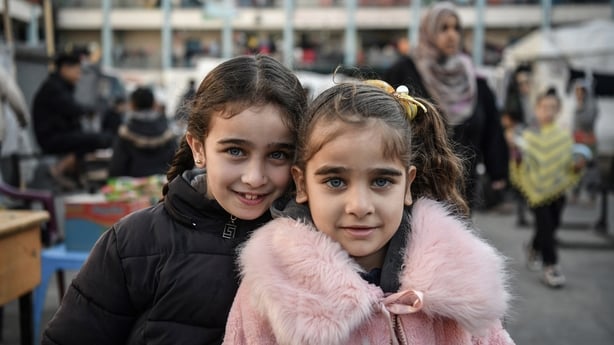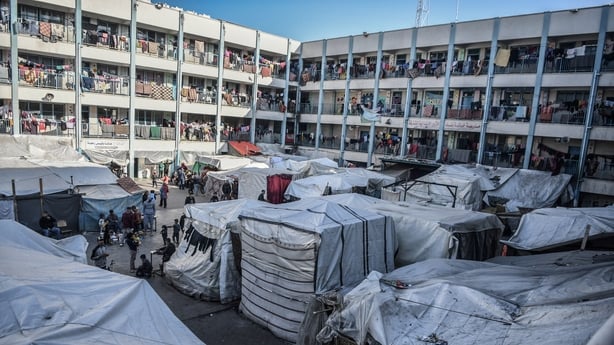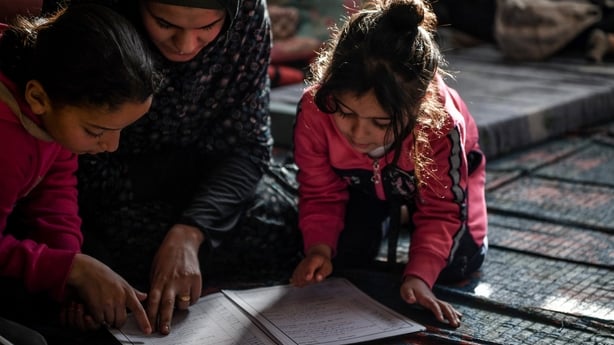Analysis: Over 625,000 children have had no school to go to and 117 schools have been destroyed completely since the Gaza war began last October
By Aisling Walsh, UL; Ahmad Aljanazrah, Birzeit University; Elaine Murtagh, UL and Ghadeer Hamed, Birzeit University
'I love school,' a young Palestinian girl who has been internally displaced, tells the UN. 'Schools are beautiful, where we study and learn.' But for this girl and an estimated 625,000 Palestinian children, there has been no school since October 7th last year.
In the midst of an unprecedented assault on the Gaza strip by the Israeli forces, videos circulate on social media of children who managed to bring their books with them when they fled their homes or doing homework amongst the rubble. Their determination to continue learning as the world around them disintegrates is testament to the importance of education for the Palestinian people.
Education has long been a priority for Palestinians. Following the 1948 Nakba, education became a means to resist the displacement and dispossession of the Palestinian people, along with the destruction of their society, culture, identity, political rights. That investing in education has remained a priority for Palestine and can be in seen in how Irish Aid supports education in the West Bank and Gaza through the United Nations Relief and Works Agency for Palestine Refugees in the Near East (UNRWA), who provide 40% of all schooling to Palestinian children, including €18 million in 2023. This investment had borne fruit as Palestinians are known as ‘the world’s best educated refugees’, with a 97.7% literacy rate.
From UNICEF, Gaza education under attack
But attacks on education in Palestine are unfortunately nothing new. Both UNRWA and the Norwegian Refugee Council have documented how schools in rural villages are regularly demolished across the West Bank. Schools in Gaza have been repeatedly attacked, students and teachers have been harassed, assaulted or arrested by the Israeli forces. School buildings are also regularly used as emergency shelters during the outbreak of hostilities, causing frequent suspensions of classes.
There are few Palestinians who have not been touched by this violence. A colleague from Birzeit University still recalls how his first ever maths class in secondary school in 1990 was interrupted by an attack from Israeli forces. "We were in the middle of a class when the Israeli army started bombarding around our school. Soldiers raided the classroom and arrested two of my classmates. The teacher tried to stop them but the soldiers beat him. After they left with the two boys, my teacher continued with the class."
Since October 7th, education in Palestine has come under an unprecedented attack. In Gaza, education has completely ceased while many schools are being used as shelters for hundreds and thousands of Gaza’s displaced people. Schools are protected under international humanitarian law and cannot be considered a military target, yet they have been actively targeted by bombardments.The UN estimates that 392 schools have been damaged, with 117 destroyed completely. In addition, it is estimated that over 230 teachers have been killed. A number of prominent university academics have also been targeted and most of Gaza’s universities have been destroyed.

Kholoud Salameh is programme manager from Right to Play, an international humanitarian organisation who continue to work with displaced children in Gaza. She says that their priority immediately following the outbreak of the war was to ensure the safety of their staff and the children they work with. "Some of them lost family members and a few of them were injured but not badly thank God. But we know nothing about one third of the children in the North."
In the absence of any educational services, Right to Play began to distribute psychosocial support kits to displaced children. These contain stories, notebooks, colouring books, pens and mini whiteboards for the children to be able to express themselves. They are also helping fill the support needs of the disabled children they had been working with and connecting other children with social workers.
Meanwhile in the West Bank, tensions have been escalating, with more than 370 Palestinians killed, including 94 children, since October 7th. Increased attacks by the Israeli military and Israeli settlers, arrests and restrictions on movement between localities has caused major disruption to daily life, including schools and universities. Many at Birzeit University in the West Bank have had to return to online learning as it is no longer safe for staff and students to travel to attend classes.

Our Learning in Motion project began by exploring the potential of learning through play for improving educational outcomes for Palestinian children by designing fun and interactive activities in the classroom. The final stage of the project has focused on adapting these strategies to online learning platforms as a form of digital gaming. Access to online learning increased dramatically during the Covid-19 pandemic, but distance learning, such as TVs, radios and computers, had been used in Palestine for many years to reach children who could not attend school in person.
If the crisis is prolonged, we believe that hybrid learning will become a permanent feature of education in Palestine. For children in the West Bank and Gaza who are experiencing profound and ongoing trauma, the addition of play and games into the classroom, online or in-person, can help to stimulate their learning and support their recovery and mental health.

As the International Court of Justice ruled last month, Palestinians are facing irreparable harm and this extends to education. The defunding of UNRWA by the US, UK and other governments will have disastrous consequences for the provision of education in the West Bank and Gaza beyond the current crisis.
Even if Gazans are allowed to rebuild their lives it will be years before the educational system is operational again. A generation of Gaza’s children will have been denied their right to education, with devastating consequences for years to come. As a Palestinian educator Kholoud's one wish is to, 'stop the war for the children's sake. Because you're talking about more than 12,000 children killed since October.’
Follow the RTÉ Brainstorm WhatsApp channel for more stories and updates
Dr Aisling Walsh is a Postdoctoral researcher at the University of Limerick with the Learning in Motion project funded by the Irish Research Council through the COALESCE fund. Dr Ahmad Aljanazrah is Associate Professor in the Department of Curriculum & Instruction at Birzeit University and Co-Principal Investigator for the Learning in Motion project. Prof Elaine Murtagh is a Professor at the University of Limerick and Co-Principal Investigator for the Learning in Motion project. Ghadeer Hamed is a Research Assistant in the Faculty of Education at Birzeit University working on the Learning in Motion project.
The views expressed here are those of the author and do not represent or reflect the views of RTÉ

